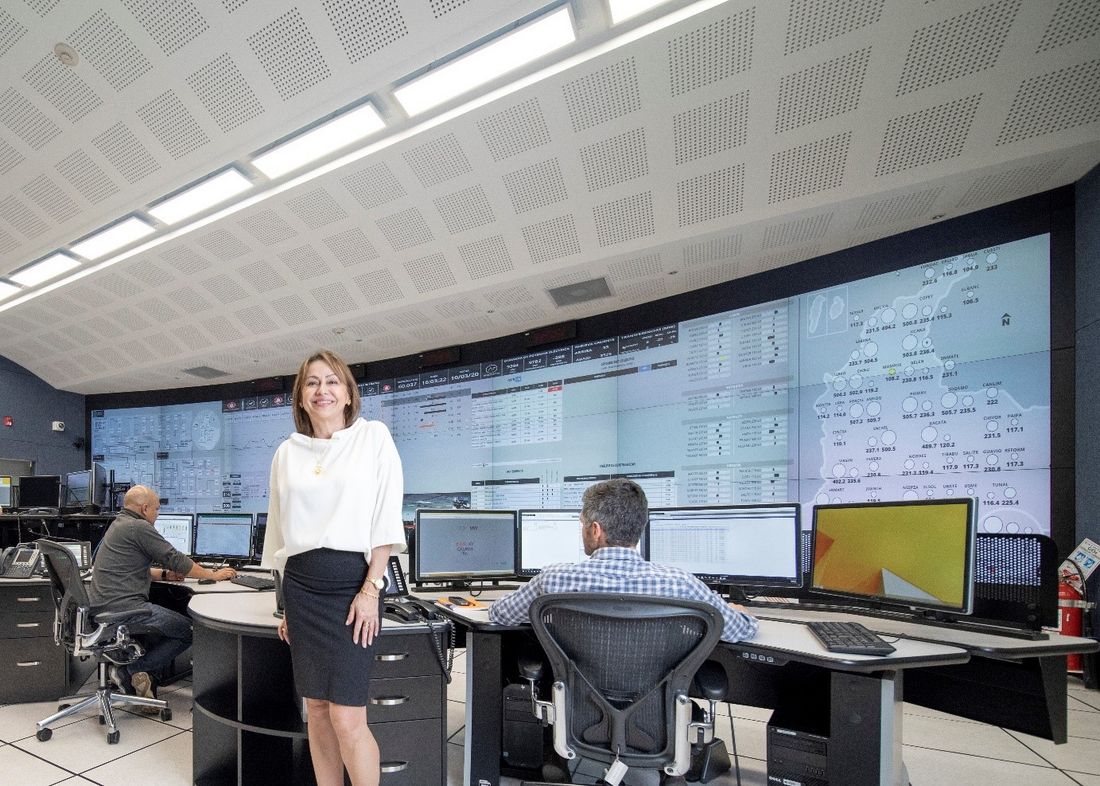An interview with Maria Nohemi Arboleda, CEO of XM
“An interview with …” is a series of articles in which senior executives give their view of the developments in the energy sector.
This article highlights the key aspects of an interview conducted by Vinay Sewdien with Maria Nohemi Arboleda, CEO of XM Colombia.

Who is Maria Nohemi Arboleda?
I am an Electrical Engineer with a MSc in Power Transmission and Distribution with more than 25 years of experience in power systems, energy planning and transactions in the Colombian wholesale energy market. I am married, my husband is an electrical engineer too, we met at university when we were students and since then, we have been together. We have 2 wonderful sons and my family is my main support in life. I love reading and enjoy the countryside. At XM, I like to work with talented and diverse people and challenge them to achieve their full potential.
What work do you currently do? How does your typical workday look like?
I am the CEO of XM since 2016. XM is a subsidiary of ISA group, a multi-Latin American transmission company (Colombia – Brazil – Perú- Chile - Bolivia) and the largest transmission company in Colombia.
Also, I am the executive president of CIGRE Colombia and president of the Committee for Regional Integration. In my role as CEO, the first aspect of my activities focus around administrative issues, making decisions, risk analysis, alignment of activities with the strategy and giving signals to the government about the present and future of the electricity sector. I find it vital to connect with my colleagues at all levels of the company. This is facilitated by the frequent coffee breaks, where I can informally talk and listen to everyone, even and more importantly during the pandemic. It is also good to hear that newcomers experience and appreciate the low barriers to executive management.
How is XM involved in CIGRE? How has XM benefited from the participation in CIGRE?
In order to talk about the involvement of XM in CIGRE, we have to refer to the enterprise group that we belong to, ISA, because before we became a company, we used to be an ISA branch. ISA has been active in CIGRE since 1993. For many years, CIGRE has been one of the main sources of information where we researched the new tendencies of the sector or looked for solutions for the problems of our system. For approximately 10 years, we were part of the Andean CIGRE Committee. After years of counting on the benefit of belonging to CIGRE, in 2018 the Colombian CIGRE National Committee was established, of which I am the executive president. Since then, XM is in charge of the administrative organization of CIGRE Colombia, as non-profit organization with the formation of nine study committees so far.
The benefit of participating in CIGRE has been very valuable for XM. With participation in CIGRE events, we get access to all type of information that is relevant for our energy sector. We also get the platform to share our experience and learn from other countries across the world. XM uses CIGRE information as a reference and state of the art for the development of new tools.
What polices is Colombia pursuing to battle climate change? How is XM supporting these policies?
Colombia has a roadmap to achieve 2.5 GW of installed solar and wind generation by 2022. Additional capacity is expected to be installed in order to achieve a reduction of 9 million tons of CO2 by 2030. XM, in its role as the system operator of Colombia is supporting these developments in different ways. Two examples are:
- XM made recommendations to the national regulatory authority on how to organize the auctions for renewable energy.
- XM is examining the flexibility requirements and needs to meet the energy transition. To this extend we also defined the main requirements for new technologies, such as wind and solar generation and battery energy storage systems.
As a company we also actively work to reduce CO2 emissions. XM has been a carbon neutral company since 5 years.
What are the biggest challenges that XM is facing, now and in the future?
The biggest challenge for XM is to develop the ability to attract the best talent. One of the ongoing efforts to increase this ability is the cultural transformation, with the focus on among others operational excellence, innovation, co-responsibility and entrepreneurship. Colombia currently has less than 0.3 GW of solar and wind generation. This is foreseen to grow to around 4.4 GW by 2024. To facilitate this uptake in renewable energy, new substations and transmission lines are being built. On the short term, the challenge is to adequately train our operators to these new conditions.
Another major challenge is the integration of the wind and solar generation and the transition to a distributed and digital system with fully active customer participation. To achieve this integration and transition, our priorities are on the increase of flexibility, resilience and interoperability. The development of complete markets to allow the customer participation as well as the associated IT tools are equally important. In terms of flexibility, we are focusing on the network, the generation and new technologies such as storage.
With the ongoing digitalization and increasing dependency on accurate information and data, cybersecurity comes in the picture. For XM, one of the most important issues is the Information Security and we take this very seriously. We have our own Security Operational Centre, where we 24x7 monitor cybersecurity threats around the world. XM participates in cybersecurity specialized groups of the National Defence Ministry. We maintain a healthy cooperation with the National Cybernetic Joint Command.
What skills in the work force are required to meet the previous mentioned challenges?
My point of view here is very clear. The concept of a job, as perceived by the new generation, is changing compared to what it is today and companies have to be aware of and act on this. We must understand that the new employees and the new generation are focused on “what they like.” We need to be aware that the new, modern work force has replaced ‘stability’ and ‘solidity’ as the conditions to be pursued.
In terms of the required skills, it is and will become even more important to be able to self-study, perform in-depth analysis, learn and adapt fast and be able to work in multi-domain projects. The key factors for XM in the cultural transformation are to be agile, adaptable and focus on innovation.
Finally, how can young professionals and seasoned experts benefit from participation in CIGRE? What is XM doing to increase this participation?
Our professionals are very motivated to participate in working groups. Making CIGRE known and accessible to our professionals has allowed them to have a point of reference to validate their work. It has also opened the opportunity for them to present their developments and proposals, gaining visibility in the professional field.
CIGRE is an excellent platform for professional growth, especially for young people. Therefore, from the management of CIGRE Colombia, we have promoted the creation of our own Next Generation Network committee, so that new professionals, not only from our company, but from all over the country, have the opportunity to experience what CIGRE has to offer. We have also reinforced this initiative with the country’s universities and today already 7 universities are collective members of CIGRE. An additional step that we must take in the future is to be able to incorporate into our performance hiring schemes the possibility that, on a voluntary basis, those professionals who wish to participate in CIGRE activities, can do so, as we are convinced that this will bring benefits.
About XM
XM is responsible for the operation and the wholesale energy market of the Colombian power system. Also XM is in charge of the international short-term electricity transactions with Ecuador. XM is part of ISA group, a transmission company active in Bolivia, Brazil, Chile, Colombia and Perú.

